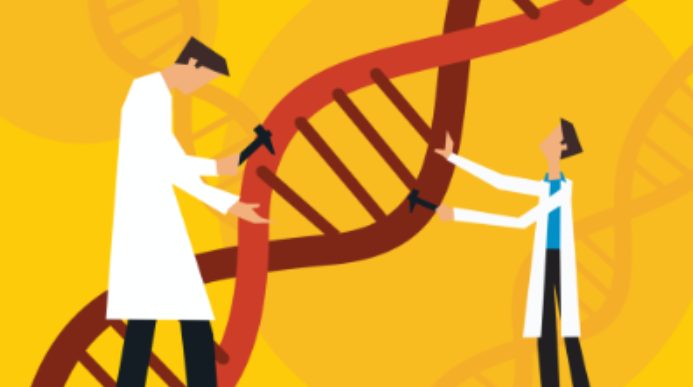Do Your Genes Fit?
March 31, 2021
Over the past year, racial tensions and attention to racial equality movements seem to have been at an all time high. Whether it is the Black Lives Matter movement or the recent attacks sweeping the nation against the AAPI community, we all need to be more conscious of the injustices against these communities. While we may think these injustices are limited to just social tensions, they permeate the very systems that we use to maintain our health: genetics and healthcare.
Precision medicine is a rapidly evolving field that customizes care to a specific patient or subgroup of patients using their genetics, lifestyle, and environment. However, our record of genetic data, like most things, is Eurocentric. Studies and biobanks which collect data use mostly White populations as subjects, even though they perform worse when used to treat minority patients. In other words, with the Eurocentric data sets we have, White people are favored and minorities are not. Important factors like allele frequencies are different across populations and using data from White patients to treat nonwhite patients is like comparing apples to oranges.
This is only one element on a long list of reasons why healthcare is inequitable. Socioeconomic factors lead to distrust of physicians, lack of diversity in healthcare professionals, lack of quality education, and poorer health insurance, all resulting in the known fact that minorities like African American and Hispanic populations are known to have poorer health outcomes.
I think another part of this problem is that the term “minority” is misleading. It implies that they are a small portion of a much larger population, and issues minorities have to face are often minimized by people’s misconception that only a few individuals are hurt. However, the reality of the situation is much different. The U.S. Census Bureau had previously predicted that “more than half of the nation’s children are expected to be part of a minority race or ethnic group2” in 2020. Even our own school is approximately one-third Hispanic, one-third African American, and one-third White, meaning that the majority of our students are “minorities.”
While the use of mainly White genetic data sets may have begun as an innocent and genuine difficulty in gaining nonwhite participants, this cannot continue. Precision medicine has been and is becoming an essential part of diagnosis, and without intervention it will only continue to disadvantage minorities further.
One of the four basic principles in biomedical ethics is nonmaleficence: inflicting the least possible harm. We may not have been the ones to build this field of medicine on a racist foundation, but we should be the ones to fix it. The severity of this issue requires us to make active changes instead of just standing by and trying not to inflict more harm. This is perfectly summarized by anti-racism speaker, educator, and author Catrice Jackson’s statement “if you don’t have an antiracism plan, you plan to be racist.3”
But the issues of racism in genetics don’t stop at precision medicine. The Alt-Right often uses accurate genetic facts to form illogical conclusions to convince people of White superiority. For example, they use the fact that people of European and Asian ancestry share some DNA with Neanderthals, who had larger skulls than humans, while those of African ancestry share no such similarity, to falsely claim that Europeans and Asians have larger brains and therefore superior intelligence. Even though there is no evidence of a difference in intelligence and other claims of White superiority that manipulate genetic data, the Alt-Right pounces on this opportunity to make it seem like they have a scientific basis to their hateful claims. They manipulate data to recruit others to follow their despicable agenda, and like racism in genetic testing, this must be stopped.
Luckily, all is not bad when it comes to racism in genetics. We have recognized the problem, and that is an important first step. Even popular genetic testing company 23AndMe’s CEO Anne Wojcicki put out a statement after George Floyd’s murder last year that read “[o]ur product is euro-centric but must expand to be inclusive and equitable. We absolutely have the potential to be better. Despite our efforts, I have to honestly say that we are also part of the problem4,” promising that she would try to do better.
Let’s build upon this momentum and continue to make progress by fighting racism in medicine and genetics so we do not have to live in a world where medical tests and procedures won’t be able to properly serve one-third5 of our population.
1 https://www.npr.org/sections/health-shots/2017/08/10/542659066/people-back-editing-genes-to-treat-disease-but-are-wary-of-inheritable-changes
2 census.gov/newsroom/press-releases/2015/cb15-tps16.html
3 https://www.harpersbazaar.com/uk/culture/a32781443/catrice-jackson-anti-racism-action/
4 https://www.23andme.com/black-lives-matter
5 https://www.census.gov/quickfacts/fact/table/US/PST045219



